Backstage at Lyric Opera
of Chicago
Production Administrator
Marina Vecci
== and ==
Artistic Services Coordinator
Josie Campbell
A Conversation with Bruce Duffie
Most of the interviews I have done are with musicians who are
visible to the audience during their performances. I have also
met a few directors and managers, and even a few critics. In 1998,
it was suggested to me that I do a series of programs featuring some of
the unsung heroes who live and work backstage at Lyric Opera of Chicago.
They are truly the ones who keep the shows running, and provide
the performers with what they need in order to bring each work to life.
As can be seen from the advertisement shown below-right, the
ten programs gave a well-rounded view of these important people. The
series ran on WNIB, Classical 97, from mid-October through mid-December
of 1998, and was repeated in early-January through mid-March of the
following year. It was a fine success, and brought many positive
comments from listeners.
Most of these interviews have been transcribed and posted on
this website. This one, with two administrators, and another with two
stage managers complete the series. It is obvious from this
conversation that these two women work well together, and their enthusiasm
shows just how much they loved their jobs and looked forward to every
situation.
Josie Campbell retired in 2018 after more than 34 years with the
company. My other guest on this page, Marina Vecci, who retired
in 2013, has actually been seen on quite a few of my previous interviews.
She provided the translation for Italian performers who required
this service . . . . .
Bruce Duffie: You’ve been on the radio with
me many times!
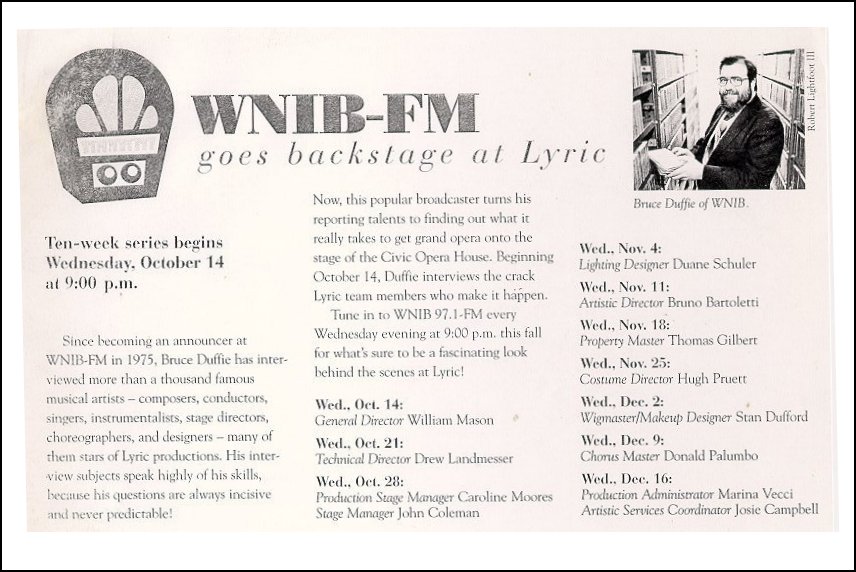
Marina Vecci: Yes, but not
with my own words; with other people’s words, as interpreter.
BD: Do you like interpreting for the backstage
people, to keep everything running?
Vecci: Yes, you could say that.
Some of our job is that we pass information. We interpret
it, and we make it understood hopefully by most. This is one
way of looking at our job, but I would say the most important one
is communicating to all kinds of people.
BD: What exactly is your title?
[Vis-à-vis the program announcement shown at right,
see my interviews with William
Mason, Drew Landmesser,
Duane Schuler, Bruno Bartoletti,
Thomas Gilbert,
Hugh Pruett, Stan Dufford, and Donald Palumbo.]
Vecci: My title is Production
Administrator, which covers a multitude of sins, among which is
being head of the rehearsal department. But Josie and I are
both heading this. Mine is just a seniority title as far as
I can see.
Josie Campbell: When there’s
a particularly prickly problem, I can say that she’s the head,
and give it over to her. [Much laughter]
BD: So, you two really do work
in tandem?
Vecci: Yes, very much so.
Campbell: Oh, yes. My
title is Artistic Services Coordinator, so I’m a little more on
the artistic administration side than Marina, who is on the production
administration side. She has more to do with contact with the
artists, and artistic planning, but not so much the execution of the
artistic plans with regard to contract fulfillment, and things like
that. Marina deals more with the physical production.
Vecci: It’s more like the costumes
and sets.
BD: Is it fun dealing with
all of these people who come in and expect everything done yesterday?
Campbell: Yes, it’s fun.
Vecci: [Laughs] Yes,
it is fun, and it is always new. Like Josie, I’ve done this
job for a very long time, and in a sense, it is always the same old
thing. There is a new season every year, but there’s always a
new group of people, or a returning group of people that we had fun with
in the past. There’s always a new adventure, so we try to get
to that new adventure part of it and enjoy it every time. It might
be frustrating at times, and you seem to have the same problems all the
time. But in trying to solve them, you find the newness of them,
and the new challenge.
BD: You’re working backstage.
Do you work in coordination with the stage manager and the
lighting designer, or do you mostly just work with the artists and
personnel?
Campbell: We work in coordination
with absolutely all the backstage groups. We’re a little
bit like the dot in the center of a starburst. Everything
goes out from us, and it happens to come back to us as well.
As Marina was saying before with the respect to communicating, information
goes out from us, and information comes in to us. Then it’s filtered
through us, and goes back out again. It’s very important to
stay coordinated with the production staff, that is the stage managers,
who are trying to coordinate the desires of the director, and also
the music staff which is trying to coordinate as best they can the desires
of the conductor, and also the singers. So, it’s really a web,
and it
’s
quite complicated.
BD: But you’re able to hold
it all together?
Campbell: We hope to, and we
try to. Everyone does.
BD: What do you do when it
starts to fall apart?
Campbell: [Looking at her cohort]
Marina?! [Much laughter]
Vecci: We panic a bit, but then
we get calm, and we try to see where we went wrong (if we did).
Then we trace the steps, and try to put it back together, and
we do. We’ve seen a lot of scenarios in which things have happened,
so we try to go back to what happened the last time in the same situation,
and see what we did, and we try to do the same thing, because we do
have a lot of little bits of panicky situations that happen. We
have to deal both with the inside opera world, and the outside during a
performance. Things happen, like a cloud in the house that might
affect us a bit, or like some people getting sick. Then we just have
to do something about that, too.

BD: It sounds like much of
your job is problem-solving.
Vecci: Yes, it is a bit of that.
BD: Is much of it anticipating
the problems so they don’t come up?
Campbell: Yes, a lot
of it is that. The first thing I noticed when I started this
job was the excellent attitude that everyone had here, and the process
of thinking which did anticipate problems. Tom Blandford [Director
of Production] especially is someone who thinks ahead to how
any situation will affect many numbers of people. One of
our biggest jobs is to anticipate every situation that crops up,
and how it affects many people, and we have to anticipate that just
as you say...
Vecci: ...and think a few steps
ahead to the best of the possibilities.
BD: A lot of this is the experience
that you have. [To Marina] How long have you been with
Lyric Opera?
Vecci: I started here part-time
in 1975. I worked as an interpreter for an Italian creative
team that only spoke Italian, which was a part-time job. Then
I went back to my regular job, and later they called me and asked
me if I wanted to be here full-time, so I came back and worked for the
Lyric Opera Center, which was then called the Opera School. I
worked there for a few years, and then I started working in the production
and rehearsal department.
BD: [To Josie] How long
have you been here?
Campbell: I’ve been here fourteen
years. This is my fifteenth season.
BD: This is one of the common
threads of all of the people I have met, that they’ve been here for
a long time. There are very few who have just arrived, and
this makes for a solid-knit family.
Campbell: It is extraordinary
that in our department there are very few people who are new.
Even after I’d been eight or nine years, it was still true that
I was one of the newer people.
BD: [With a wink] I assume
you look forward to being here forever and ever, and ever?
Campbell: Yes. It’s one
of the reasons that we work so well together.
Vecci: Yes, it’s really true.
We feel like a team, and we all work well together and enjoy working
together.
Campbell: By now, we all know
so well what each one of us does, and what each of us can be relied
upon to do the best. [Big smiles and nods all around] To
go back to what you were saying about things falling apart, in all
my time here I don’t know that anything has ever truly fallen apart.
I would define that as having to bring down the curtain, and not somehow
being able to solve whatever problem came up. We’re pretty good
at solving any problem that comes up. Having said that, it sometimes
seems to me to be amazing that we bring up the curtain at all, considering
what has to go into this art form, and how crazy it is.
BD: Is it too crazy?
Campbell: No, no!
Vecci: It’s just crazy enough.
BD: Why is it so crazy?
Vecci: You have all those creative
people, and then you have to do such a creative thing within a
deadline, and somehow there is often a conflict of ideas. You
have to produce this thing that is something which would require so
much indefinite time and infinite resources, and you have to do it within
a certain time. You have to open on a certain day, so everybody
gets very worried about this, even though you know it’s going to happen.
That’s part of the nature of the beast, and is part of the problem,
and the audience doesn’t know about it.
Campbell: Yes, we’re all really
good at finding ways to make things happen that have to happen, whether
it’s getting a set built on time so that it can be rehearsed upon,
or getting the wigs finished...
Vecci: ... or getting the costumes
all done, and getting the artists to know their roles fully and
completely. If it’s a new opera, making sure that parts have
been finished as they sit down and rehearse. The system works
very well, and is working very well, in spite of the basic seeming
irrationality of the whole thing. There was a rationality that
happens.
Campbell: Maybe that’s why
it’s crazy, because it’s irrational.
BD: That’s right. Samuel
Johnson famously called opera ‘an exotic
and irrational entertainment’. [Samuel
Johnson (September 18, 1709 – December 13, 1784) was an English writer
who made lasting contributions as a poet, playwright, essayist, moralist,
literary critic, sermonist, biographer, editor, and lexicographer.
The Oxford Dictionary of National Biography calls him ‘arguably
the most distinguished man of letters in English history’.]
Vecci: There are some irrational
parts, but it’s an endlessly fascinating process.
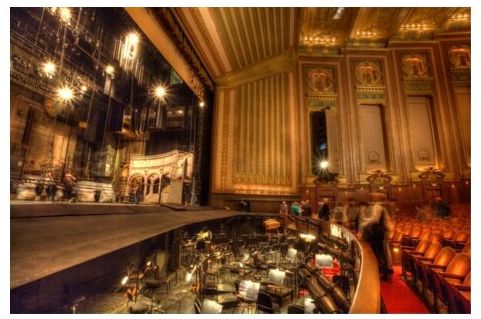
Campbell: I can’t remember ever
being bored here. There are longs stretches of quiet backstage,
let’s not be deceived. There are nights when things go awfully
well... [All laugh]
BD: Are those nice times to
be able to sit and just soak it all in?
Campbell: Yes.
Vecci: That’s so nice.
Campbell: But one mustn’t get
complacent. One has to be alert to the simmering events.
BD: You’re always on call?
Campbell: If we are on the
premises, we are certainly on call.
Vecci: [Laughs] We always
try to see what’s going to happen next.
BD: I would assume that you look
back on all of these problems which have been solved as fun problems,
rather than disasters.
Vecci: Yes, because if something
has happened that was disturbing, or wrong, or very difficult,
a while after you’ve solved it, or if someone else has solved
it, you look back at it and you smile... not immediately after
it, but... [Laughs]
Campbell: There are very few
things that I can think of that have been disasters. Even
the things that were horrific at the time, that we felt were so
horrible, we couldn’t look back and say it was *that* horrible.
BD: That’s very comforting.
Vecci: Maybe it was a close
call, or something interesting like that. We can look back
and enjoy the thought, and the adventure that happened.
* * *
* *
BD: You both may see the principal
singers and the secondary singers in a little different light
than the stage managers and even the directors, because they’re
working so hard out there getting everything done. You see
them perhaps in a more relaxed situation just before they’re going
on, or in a more tense situation when they’re just arriving at the
theater. How have singers changed over the years that you’ve
been watching them, if at all? Are they becoming more neurotic
or less neurotic, more friendly or less friendly, or is there a way
of generalizing because each one is an individual?
Vecci: I would say that each one
is an individual, and you can’t really generalize other than the
most obvious things. You can say that there may be a general
barrier-like defensiveness when someone arrives for the first time
in a new place, and therefore a little bit of an aura as they come
in and they approach us because they don’t know what to expect. I’ve
always found from the moment that they know that we are there for them,
and see that we will do anything we can to help out and be of service,
they relax and become very friendly, and very nice, and just absolutely
a pleasure to deal with. For the most part, for the ninety-nine
percent of them, it’s just a pleasure. It’s one of the things that
makes this job great, and also to see this little bit of a transformation.
I’m not saying that everybody comes in being guarded and defensive, not
at all. But if could make a generalization, that is it.
BD: They wonder what they’re
going to find?
Vecci: Exactly.
Campbell: Yes. They don’t
necessarily know what to expect.
Vecci: Then comes the moment
that they realize we’re really trying to help. This is a
very friendly house, and it comes from the top. It is always
that we’re doing anything we can to help the singer to settle in,
and to relax, and to be comfortable with the environment.
Campbell: I always say that
if we’re going to ask them to come to Chicago in January, we’ve
got to treat them well. [Laughter]
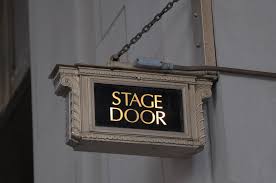
Vecci: Yes, it does help.
We try very hard to make them feel comfortable, and they respond
very well.
Campbell: They need a welcoming
environment. We’re right inside the stage door, so we’re the
first thing they see the first time they ever come to the theater.
Vecci: Whether they like it
or not! [Much laughter]
Campbell: But we’re a presence
there whatever that presence is interpreted as being.
BD: So, you’ve got to establish
a trust right away?
Campbell: We try to, yes.
We certainly do, and, generally speaking, they very much like it
that there is a center right there as they come in the door where
they can communicate everything they need to, and get all their mail,
and find out what they need to find out.
Vecci: They find their schedule,
ask the questions, and do all of that stuff.
Campbell: The information we provide
for them is everything from the important bits
— like exactly
what their schedule is, or when exactly they’ll be paid and how
exactly they’ll be paid
— to the more incidental things having
to do with their lives while they’re here.
Vecci: Where is the dog groomer...
Campbell: ...or where they
can get their favorite kind of lozenges. Where can they put their
child in school, or where can they buy a coat?
Vecci: Where they can get the
produce
— fresh fruit and broccoli. All those mundane
things.
Campbell: Where is there a
homeopathic apothecary...
Vecci: ...or a chiropractor!
Campbell: Absolutely everything.
You name it.
BD: So, you really have to
know everything that’s available here in Chicago.
Campbell: I don’t know that
we need to know it, but we certainly need to know how to send them
in the right direction to find somebody who does.
Vecci: Which is the good restaurant
to go for fish? Josie knows all of those things!
Campbell: Right.
BD: When someone comes back
and says that was a good idea, or a good suggestion, do you make
a mental note so that becomes part of your list?
Campbell: Yes, exactly. You
bet. Over time, I’ve got all sorts of recommendations.
[Much laughter]
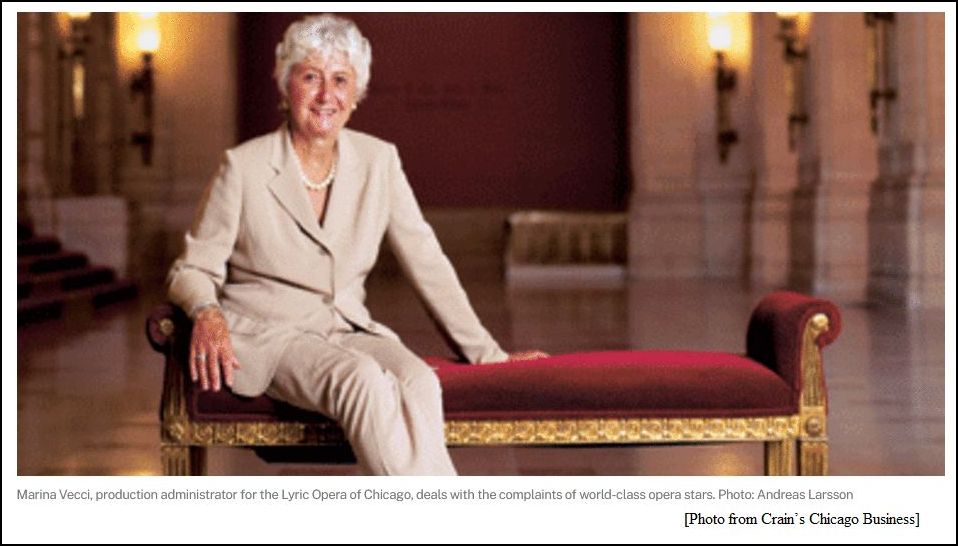
Vecci: All sorts.
Campbell: That’s the good thing
about being here a long time.
Vecci: Right.
* * *
* *
BD: Because of the renovations a
couple of years ago, you wound up with a whole new backstage layout,
and facilities, and everything. Are they working as well
as you had anticipated?
Vecci: Yes. Those of us who
have been there for a long time can see the difference between what
we had and what we have now. It’s so immense and wonderful.
BD: I remember going down that
little ramp into the funny little room...
Vecci: You remember it correctly.
Our office looked like that. We had a door that was in this
dungeon, and we were standing right there. Now we have this open
glass window. We see people coming through, and it’s nice
and comfortable.
Campbell: Right. In the
olden days, the rehearsal department used to have to rely on one
of those corner hall mirrors like you see in a parking garage. [Much
laughter]
Vecci: There was no place to
hide.
Campbell: But it’s a two-way
street, so they had no place to hide either!
BD: Do the singers seem to
like the new backstage facilities?
Vecci: Of course. Just think
of the dressing rooms for the artists... you know how terrible they
were. Now they’re really nice and comfortable, and they have
space. Of course, we could use another four big rehearsal rooms,
and ten coaching rooms, because the more you have the more you need,
and the more accustomed to good things you become. But it’s been a
great, great, great change.
BD: Are you both with Lyric all year
round?
Campbell: Yes.
Vecci: We’re full-time. These
are year-round positions, and we also have a different office
when the season is over. Josie and I have offices on the fourth
floor, away from the backstage area.
BD: Do you look forward to
that, or do you kind of miss it?
Vecci: It’s a challenge.
Campbell: I’m always a little
regretful to that. It’s really nice to have the variety of
one’s schedule, but after the season is over, I go back to working
9 to 5, Monday through Friday, and I have two-day weekends once again.
BD: [With a wink] Horrors!
[Laughter all around]
Campbell: Then, when the season
gets going, it’s nice to get back and have that variety. But
that’s true not only of us. It’s true
of everyone on our staff because they all put in long hours during
the season. It’s always a little more interesting backstage
than upstairs in the off-season, as you might imagine.
BD: What kind of things do
you do in the off-season?
Campbell: We recover from what just
happened, [laughter] and we finish up all the paperwork and loose
ends of administrative stuff. Then we start right away planning
for the next onslaught, and we give some support to those above us.
I work a lot on the travel and accommodation, and also the auditions
that occur in the off-season in other cities in the world for our
people to hear. Most of what I did during the last off-season
was in and around auditions happening in other parts of the world for
Mr. Mason [General Director of Lyric Opera] to hear.
BD: Do you go with them to
hear auditions?
Campbell: No. I stay
here and monitor it all.
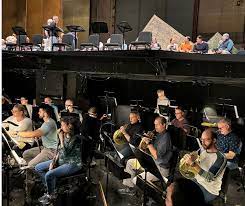
Vecci: You had many situations
which were happening the other side of the world, and you were on
the telephone.
BD: Do you like the voices
that you hear at Lyric Opera?
Campbell: Yes.
Vecci: We heard a lot with
the Sitzprobe this afternoon. [A Sitzprobe,
literally a seated rehearsal, is often the first rehearsal where the
singers sing with the orchestra, focusing attention on integrating the
two groups. When the performers stand or do blocking, it is called
a Wandelprobe.]
BD: Did you get to go out into
the house to listen?
Vecci: We have a PA system, so we heard
some of it.
Campbell: If we’re running
an errand out to the house, we get a chance to hear it there.
Or if we have a few minutes between things, we run out and
listen a bit. I like to do that. It’s important to hear
what it sounds like out there.
Vecci: It’s one of the bonuses of our
job that you can sneak out there and listen to these things....
Campbell: ...or stride boldly
out and listen!
BD: Are there ever times when
you get to go out and listen to an entire performance?
Campbell: Yes, and it’s important
to do that too, because a performance itself is a situation that’s
sort of apart. There are certain things that happen only in
a performance. The dynamic is in the energy, and that is different
than in any rehearsal. It’s important for us to experience
that.
Vecci: After working here, I don’t
think I can ever again go to the opera as a spectator. I
used to go before I was in this job, but now I always worry about
something. [Laughs] I don’t know why. Nothing
bad ever happens, but it’s just that feeling.
Campbell: Like why didn’t that
torch go on?
Vecci: Yes, or whether she
will come in on time or not. We have these doors that open,
and someone is supposed to be there, and maybe they will not.
I always worry about these things when I watch. I don’t know
why I should worry about those things.
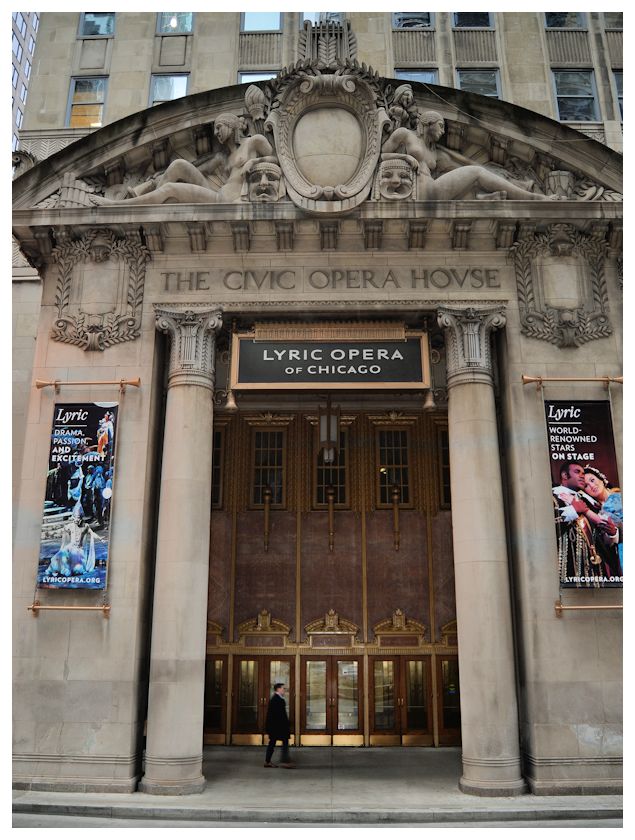
BD: Is this just when you are
here at Lyric, or also when you go to other theaters?
Vecci: It’s
when I go to any performance of opera in any place... not that I go
that often, but if I go, I always worry about these things.
Campbell: [With a wink] When
do you have time to go?
Vecci: Yes, when do I have
time to go? [Both laugh]
BD: Knowing you as I do, you
probably even worry when watching a film.
Vecci: No! [All laugh]
But I don’t go to films anymore. Opera is the only thing
to go listen to and see. A film is not as rich as opera anymore.
It’s spoiled all the excitement for me.
BD: I assume it’s a good spoil?
Vecci: Oh, it’s an excellent
spoil!
BD: Why do we do opera?
Vecci: It’s a good question.
[With mock seriousness] It’s so that
we can have a rehearsal department and Josie and I get work. [Much
laughter]
Campbell: It’s
our livelihood.
Vecci: Seriously, we couldn’t
live without opera.
BD: I know I couldn’t.
Vecci: Exactly, so there you
are. There are three of us who couldn’t live without opera,
and I’m sure that the rest of the world feels the same way... or
they should, but they don’t.
Campbell: It’s so fulfilling when it’s
done right. There’s nothing like it when it’s right.
It’s very hard to do get it right, but boy, it’s so satisfying.
BD: That’s why we’re spoiled
here in Chicago, because Lyric Opera always does it right.
Campbell: Always?
Vecci: Yes, for the most part.
Campbell: Virtually always.
BD: As near as humanly possible.
Vecci: Yes.
Campbell: Better than anyone,
that’s for sure.
BD: That’s right, partly thanks to you two.
Campbell: You’re very kind.
Vecci: Very kind.
BD: In the end, is it all worth it?
Campbell: Oh, yes. It
is enjoyable, and I love my job. I’m very lucky, so it’s
not a question of it being worth it really... not to me anyway.
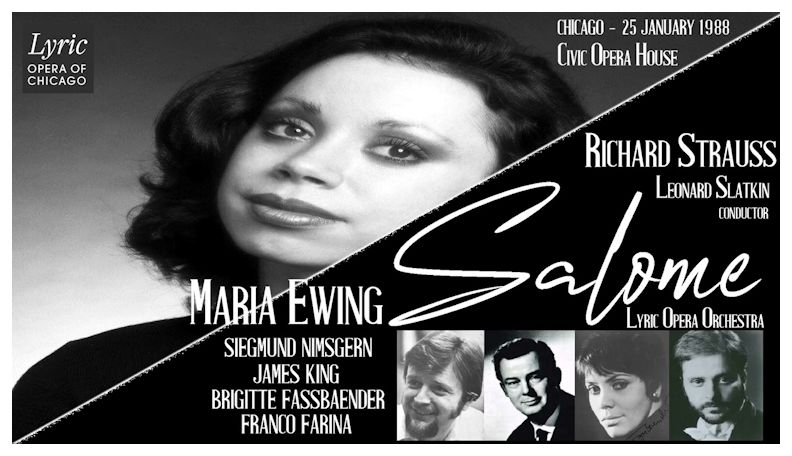
Vecci: Yes, in the same
way it is really worth it.
* * *
* *
BD: Can I assume there are some productions
which are physically more difficult than others, and a few that
are easy?
Campbell: Let’s start with
easy ones. [Laughter all round]
Vecci: [With mock horror] Easy
ones???
Campbell: Salome. [Vis-à-vis
the title-card for the video shown at right, see my interviews with
Siegmund Nimsgern,
James King, Brigitte Fassbaender,
and Leonard Slatkin.
Also in the cast was Sharon Graham, and
the original director was Sir Peter Hall.]
Vecci: Yes. It’s 100 minutes and
it has no chorus. Just small groups of people.
BD: What about La Voix Humaine?
That’s just one person.
Vecci: Oh, that was very easy.
Campbell: Yes, that was very
easy.
BD: Is it just the numbers
of people that makes it easy?
Campbell: It really does make
it easier, but sometimes it depends on which people are involved.
Generally speaking, the more groups you’ve got, the more
chaotic it is to administrate. In Aïda, the same
people who are blue in Act 2 have to be red in Act 3. So that’s
a lot of work.
Vecci: And it’s
messy!
Campbell: A lot of extra make-up people,
and ends up being more work for the cleaning crew. It’s all
a domino effect. La Gioconda has children’s chorus, ballet,
chorus, extra chorus, lots of principals, fair number of supers,
and it’s a big costume and wig show. So, there is just more
to coordinate.
BD: Is there more congestion
backstage?
Campbell: Yes, more congestion.
BD: I would assume though that
something such as Die Meistersinger, with its huge cast and
chorus, might be easier than something with a lot of supers, where
you have people who are not necessarily involved in it day to
day. [The 1977 production of Meistersinger is shown below-left.
See my interviews with Ferdinand Leitner, and
Nathaniel Merrill.
Also in the cast (among others) were Pilar Lorengar, William Johns, Gwynne Howell, Kenneth
Riegel, Frank Little,
and William Powers.]
Vecci: Now we are having the
satiation in which supers have become so prevalent and integral
to the show, that somehow you have a lot of supers no matter what
you do. So they’re really part of the cast. It has
become much more like that. This is one transformation.
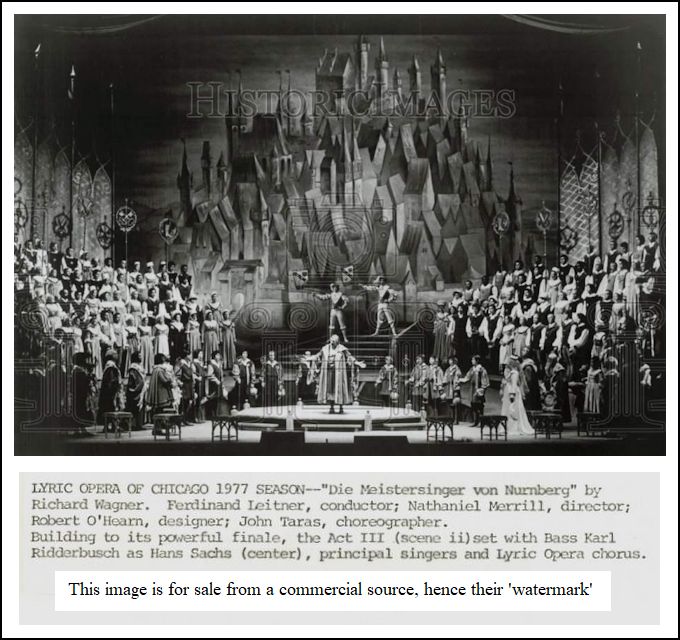
Campbell: They are more seasoned
and more reliable.
Vecci: Yes. They’re present
more at rehearsals, and therefore they get more integrated in
the whole situation. They are really more than people that
used to just carry the proverbial spear in and out.
BD: [With a wink] You don’t long
for the days when you went out into the street and paid someone
$1 to carry a spear across the stage?
Vecci: [Laughs] It was a bit more
like that in the past when I started working here. Now
the supers are more like actors. They’re more involved, and
they all show a deeper understanding as far as I can tell, which is
a very good thing. The shows are more interesting as a spectacle
from a visual and dramatic point of view, so this is good. [See
my interview with Ken
Recu, Captain of the Supers at Lyric Opera 1977-83.]
BD: Are you able to have some
influence on ideas, or repertoire, or production, or anything at
all, or are you just making sure everything gets done correctly?
Campbell: It’s mostly making
sure that the plan is implemented. Sometimes, when we’ve
had emergencies with last minute cancellations, or last minute
replacements, we’ve had some input into who would be good, but this
was just sort of brainstorming at the last minute as to who might
be available, and ready, and prepared, and handy for that sort of thing.
BD: Do you help make the schedule?
Campbell: We implement the
schedule as it’s made by the production manager, who is the point
person for that.
BD: Do you look at the schedule
and say something can’t work because of such and such?
Campbell: Yes. If we
something that can’t work, we can make minor changes to it, or if
things occur at the last minute.
Vecci: Yes, a last minute change because
someone disappears...
Campbell: ...or they’ve made
more progress with a scene than they anticipated, so they have
decided not to do that scene tomorrow after all. They’ll do
other scenes, and we just change it. The thing about implementing
the schedule is that it’s almost constantly changing.
BD: As they say, the only constant
is change.
Campbell: Yes.
Vecci: Yes, but we mostly just
implement the schedule, and disseminate the information regarding
the schedule to everybody who needs to have it.
Campbell: In a relentless fashion.
Vecci: [Laughs] In a relentless
fashion, yes. We leave no stone unturned to reach the person
or persons, and tell them where they should be and at what time
the following day.
* * *
* *
BD: Is there anything you would change
about your job?
Vecci: I would start the season
later, just so that the summer is longer. Come the end of August
we have to say goodbye to the outdoors.
BD: Arrange for outdoor opera? [In
the last few years, Lyric has presented a concert at Millennium Park,
which is an outdoor venue downtown in Grant Park on the lakeshore,
seen in the photo by Kyle Flubacker below-right.]
Campbell: Why leave it at
that? [As if dreaming] Why not move it to the island
of St. Kitts?
Vecci: Right, yes...
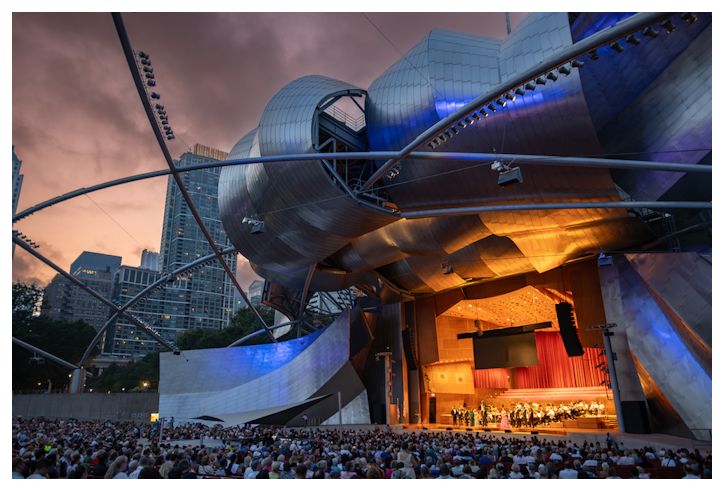
BD: And then we’ll just
transport the audience, also?
Campbell: I will say nothing
against the city of Chicago.
Vecci: No, we love it.
Campbell: The climate of Chicago
has nothing to do with Chicago itself. [Much laughter]
Vecci: If I were on my own,
I would start three weeks later, and go later.
BD: Perhaps it would be easier
to change the weather than to change the opera season.
Vecci: I don’t know about that
[more laughter], but if you know anyone who can help us with
that, we can talk to this person.
Campbell: In all our years
of experience, surely we’ve encountered somebody who professes
to be able to change the weather! [Laughter continues]
BD: That’s right. That’s
part of your job. You must know where to go for this.
Vecci: We must know the right
person, because we don’t solve all the problems but we almost always
know the person who can solve the problem. Josie and I can direct
you to the person who can solve the problem if we can’t solve it ourselves.
In essence, that is our job.
BD: You’re very essential.
Vecci: [Big sigh] Well,
yes...
Campbell: She’s Italian, actually.
BD: Where are you from originally?
Vecci: Torino.
BD: How and why did you wind
up in Chicago?
Vecci: It’s a long story...
[She laughs]
Campbell: [Softly singing the
line from Mimì’s aria in La Bohème]
La storia mia è breve... [My story is short]
Vecci: My husband got a fellowship to come
to Northwestern University, and I came with him in 1971 as a
graduate student’s wife, and the rest is history.
BD: Thank you for being part
of Lyric Opera for so long. I hope it continues for a long time
to come.
Campbell: Thank you.
Vecci: Well, thank you, Bruce.
It was a pleasure.
========
========
========
----- ----- -----
======== ========
========
© 1998 Bruce Duffie
This conversation was recorded at the Civic Opera House in Chicago
on September 18, 1998. Portions were broadcast on WNIB the following
December, and again
in March of 1999. This transcription
was made in 2025, and posted
on this website at that time.
My thanks to British
soprano Una Barry
for her help in preparing this
website presentation.
To see a full list (with links) of interviews which have been transcribed
and posted
on this website, click here.
To read my thoughts
on editing these interviews for print,
as well as a few other interesting observations,
click
here.
* * * *
*
Award -
winning broadcaster
Bruce Duffie was with WNIB,
Classical 97 in
Chicago from 1975 until
its final moment as a classical
station in February of 2001.
His interviews have also appeared
in various magazines and journals
since 1980, and he continued his broadcast
series on WNUR-FM,
as well as on Contemporary
Classical Internet Radio.
You are invited
to visit his website for
more information
about his work, including selected
transcripts of other interviews,
plus a full
list of his guests.
He would also like to call your attention
to the photos and information about
his grandfather,
who was a pioneer
in the automotive field more than a century
ago. You
may also send him E-Mail
with comments,
questions and suggestions.









